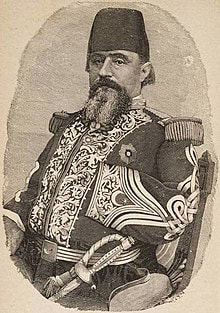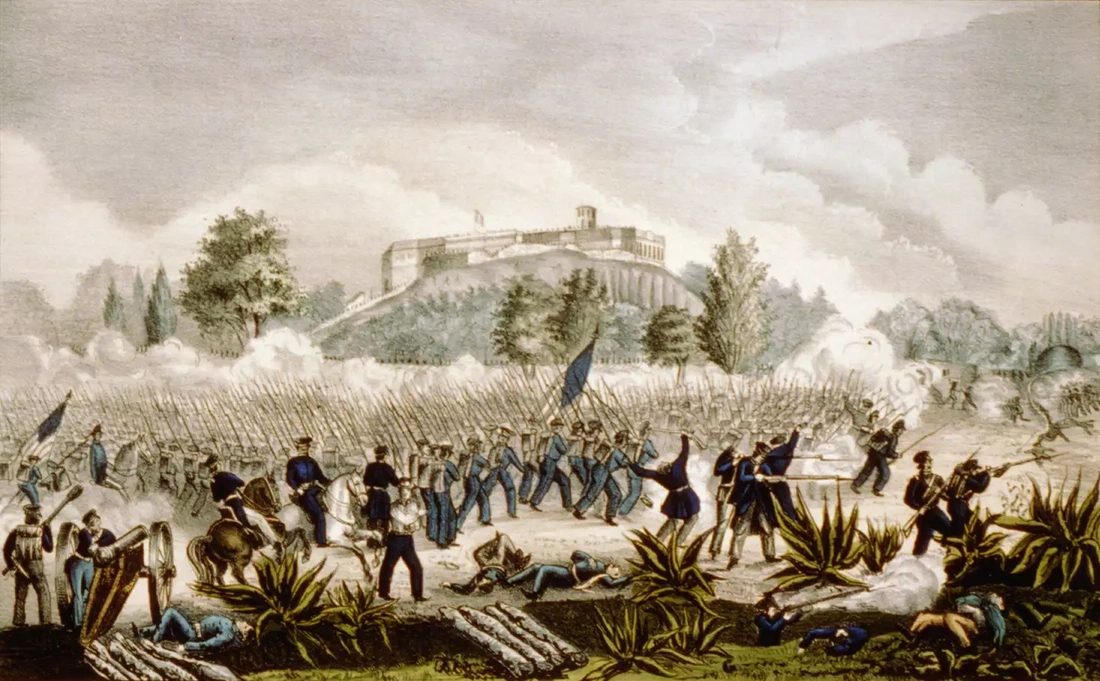 William Wing Loring’s military career spanned more than four decades. He fought under three different flags. Born in Wilmington, North Carolina, on December 4, 1818, his father could trace his ancestry back to the original Plymouth Colony and his mother came from a prominent North Carolina family. The family moved to St. Augustine, Florida soon after Spain ceded it to the United States. Loring’s military career began when he was 14 years old and joined the 2nd Florida Volunteers to fight Seminole Indians. When he was 17, stories about the Battle of the Alamo inspired Loring to run away from home and join the Texas revolutionaries. His time as a Texas patriot was short. His father tracked him down and forced him to return home, where he rejoined his old unit. By the time he was 18, he had risen in the ranks to 2nd lieutenant. A year later, his family sent him to a prestigious Boarding School in Alexandria. From there he went to Georgetown College. He was admitted to the Florida bar in 1842, and served in the Florida House of Representatives from 1843 to 1845. When the Mexican-American War began, Loring left his law practice to join the Regiment of Mounted Riflemen as a captain. He was storming the Castle of Chapultepec at Mexico City when he lost his arm. Because of his gallant actions in that battle, he was promoted to brevet colonel. After the war, Loring decided to stay in the Army instead of returning to his law practice.  Loring was given command of the Rio Grande frontier in Texas in 1852. Four years later, he became the youngest line colonel in the history of the army. In 1857 he and the Rifles were transferred to New Mexico, where they took part in operations against the Apache, Comanche and Kiowa, and fought in the Mormon War. He was named commander of the Department of New Mexico in March of 1861, but he didn’t hold the post long. Soon after Fort Sumner was shelled, he resigned his commission to join the Confederate Army. Some historians speculate that Loring either planned to deliver New Mexico to the Confederacy or put Union supplies into the hands of Confederate Brigadier General Henry Hopkins Sibley, but he did neither. Loring did the honorable thing and left the territory in Union hands. In a conference in New Mexico, before departing for Confederate service, Loring told his officers, "The South is my home, and I am going to throw up my commission and shall join the Southern Army, and each of you can do as you think best." Loring’s service during the Civil War started well, but became embroiled in arguments with other Confederates. Jefferson Davis welcomed him by promoting him to brigadier general, and then General Robert E. Lee assigned him to the Army of Northwestern Virginia. However, Lee soon had misgivings about Loring’s command. By the end of the year, Loring’s army was sent to assist General Thomas J. “Stonewall” Jackson’s campaign in the Shenandoah Valley. Again, he and his superior did not get along. Anxious not to alienate either commander, the Confederate government promoted Loring to major general and reassigned him to southeastern Virginia. Loring later resigned over a conflict concerning recruiting practices in Virginia. When he regretted his resignation and sought reassignment, Robert E. Lee is supposed to have said, “There is no room in this army for that man.” Lee’s opinion may have developed because of Loring’s explosive temper. His salty language --one soldier said that he could "curse a cannon uphill without horses" – may have also played a part. It is also true that the highest ranks of the Confederacy were a bit of an old boy’s club, with most of the members having been trained at West Point, and Loring was not part of that crowd. Whatever the cause of the upper echelon’s enmity against him, the men under him did not feel the same. They followed him obediently and even gave him nicknames, including “Old One Wing,” “Old Ringlets,” and “Old Billy.” After he urged his men to “Give them blizzards, boys, give them blizzards!” during the defense of Fort Pemberton against the Federal flotilla on the Mississippi River, he earned the nickname “Old Blizzards.”  Loring Pasha as a general in the Khedivate of Egypt Loring Pasha as a general in the Khedivate of EgyptWhen Loring had gotten on the wrong side of every superior in Virginia, he was sent to defend Vicksburg. There, he argued with General John C. Pemberton and was subsequently assigned to the Army of Mississippi under General Leonidas Polk. Loring was shot in the chest and spent several months recuperating before being assigned to serve under General John B. Hood in Tennessee. After the war over, Loring spent some time in New York City, trying to develop a career in banking. Bored with civilian life, he moved to Egypt, where he joined Henry Hopkins Sibley and several other Americans who came to help modernize the Egyptian army. Loring, in charge of the country’s coastal defenses, became a favorite of Ismail, the Khedive and earned the title of “Fereck Pasha” or major general. Loring wrote a book about his Egyptian experiences, entitled A Confederate Soldier in Egypt (1884).He died two years later, in New York City. To read about how his monument was moved in 2020, click here. Jennifer Bohnhoff is a former educator who now devotes her time to writing historical and contemporary fiction for middle grade and adult readers. She has written a trilogy of novels set in New Mexico during the Civil War which is entitled Rebels Along the Rio Grande. |






No comments:
Post a Comment